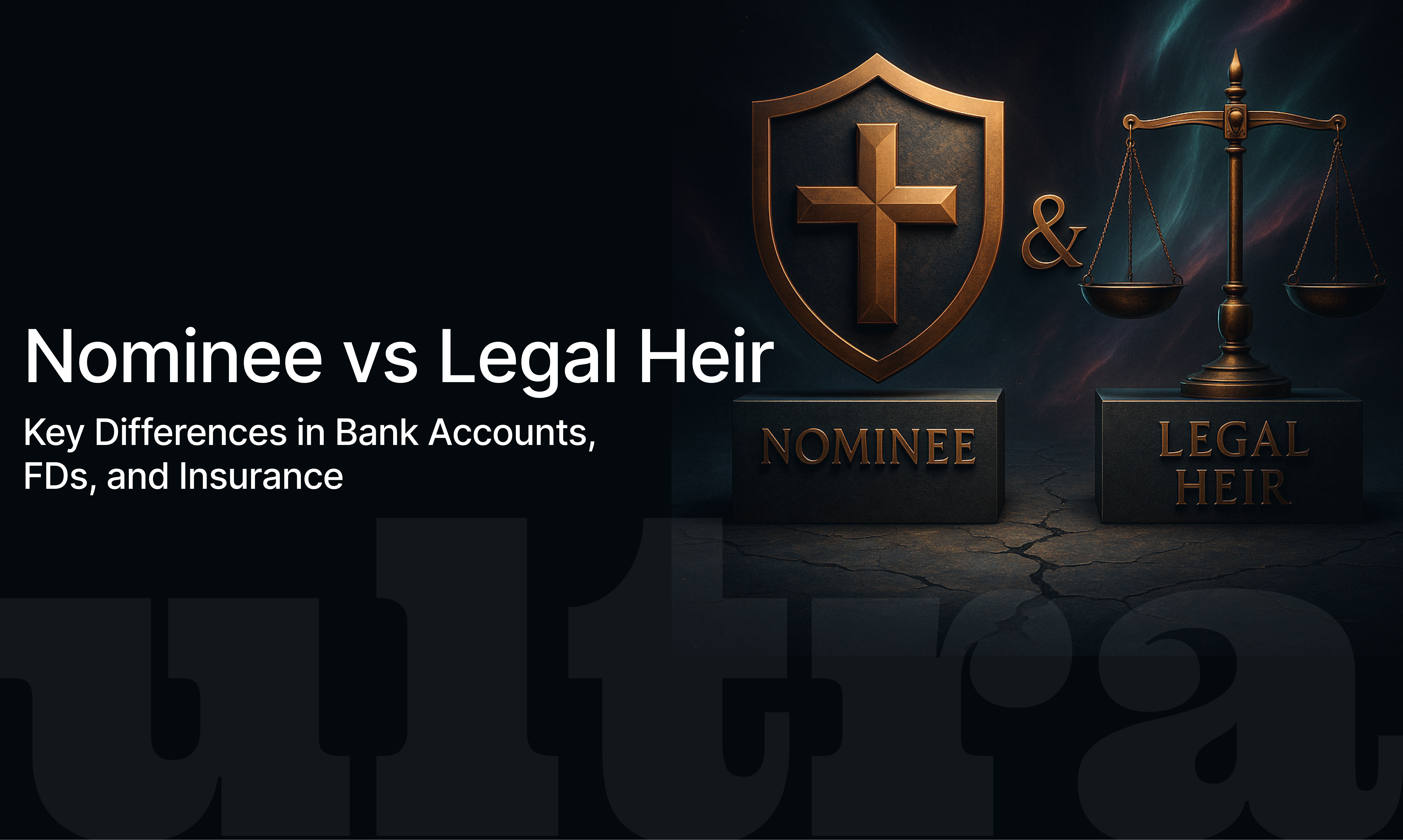Nominee vs Legal Heir – Know the Difference Before You Invest
12 August 2025 · Sachin Gadekar
A complete guide to understanding nominee vs legal heir in India for bank accounts, fixed deposits, and insurance policies.

Introduction
When it comes to financial assets like bank accounts, fixed deposits (FDs), and insurance policies, one question often confuses people: Does a nominee automatically become the owner of the money after the account holder’s death?
At Ultra, a digital platform offering multiple investment opportunities, we believe that understanding the distinction between a nominee and a legal heir is crucial for effective wealth transfer planning.
This article explains the difference, the legal implications, and how each role functions for various financial products.
What is a Nominee?
A nominee is a person designated by the asset holder to receive the proceeds of a financial asset upon their death. The nominee acts as a trustee, ensuring that the funds are handed over to the rightful legal heirs.
Purpose: Facilitates smooth transfer of funds after the account holder’s death.
Rights: Custodial rights, not ownership rights (except in some cases like specific mutual fund nominations where rules differ).
Appointment: Done at the time of opening an account, purchasing insurance, or investing in an FD.
What is a Legal Heir?
A legal heir is an individual who is entitled by law to inherit the assets of a deceased person. Legal heirs are determined based on succession laws in India:
Hindu Succession Act, 1956 for Hindus, Buddhists, Jains, Sikhs.
Indian Succession Act, 1925 for Christians and Parsis.
Muslim Personal Law (Shariat) Application Act, 1937 for Muslims.
Legal heirs can include:
Spouse
Children (biological or adopted)
Parents
Other relatives as per succession rules
Nominee vs Legal Heir – The Core Difference
| Aspect | Nominee | Legal Heir |
|---|---|---|
| Role | Custodian of assets after death of holder | Owner/beneficiary of assets as per law |
| Rights | Holds the asset temporarily until legal heirs claim it | Permanent ownership as per succession laws |
| Determined By | Nomination form filled during account opening | Personal laws of inheritance or will |
| Legal Standing | Acts as trustee for legal heirs | True beneficiary |
| Can Be Same Person? | Yes, if the nominee is also a legal heir | Yes |
Nominee vs Legal Heir in Bank Accounts
When the account holder dies, the bank transfers the funds to the nominee mentioned in the account records. However, this does not mean the nominee becomes the owner.
Example: If a father nominates his friend in a bank account but has a will leaving the money to his children, the children (legal heirs) can legally claim the money from the nominee.
Key takeaway: A nominee in a bank account is a caretaker, not the final owner.
FD Nominee vs Legal Heir
In the case of Fixed Deposits:
The bank releases the FD amount to the nominee on maturity or upon the depositor’s death.
The legal heirs can still claim the amount if they are entitled under succession laws.
Tip: Always align your FD nomination with your estate plan to avoid disputes.
Insurance Nominee vs Legal Heir
Life insurance works slightly differently:
In insurance policies, especially life insurance, the nominee can be either a beneficial nominee (receives proceeds directly) or an appointee nominee (holds on behalf of legal heirs).
As per IRDAI regulations, if a beneficial nominee is a close family member (spouse, parents, or children), they are usually the rightful claimants unless challenged in court.
Note: If your nominee is not a legal heir, other heirs may still contest the payout.
Why This Distinction Matters
Avoid Legal Disputes – Mismatched nominations and wills can lead to years of litigation.
Faster Access to Funds – Clear nomination ensures quicker fund release after death.
Estate Planning – Helps ensure your assets go to your intended beneficiaries.
Best Practices for Aligning Nominees and Legal Heirs
Match Nominees with Your Will – Ensure your nomination forms match your written will.
Update Regularly – Change nominees after major life events like marriage or childbirth.
Inform Family Members – Let your legal heirs know who the nominees are.
Consider Joint Ownership – For large bank accounts and FDs, consider joint holding with the intended legal heir.
Nominee vs Legal Heir – Key Legal Precedents
Indian courts have consistently ruled that:
A nominee is a trustee for the legal heirs, not the owner.
Ownership rights rest with legal heirs as per succession laws or will.
This means the legal heir always has the stronger claim, unless specific product rules (like beneficial nominees in life insurance) apply.
FAQs on Nominee vs Legal Heir
Q1. Can a nominee and legal heir be the same person?
Yes, if you nominate someone who is also your legal heir (e.g., your spouse or child), they can be both trustee and rightful owner.
Q2. Who gets priority – nominee or legal heir?
In most cases, legal heirs have final ownership rights. The nominee just holds the asset temporarily.
Q3. Can a nominee keep the money?
No, unless the nominee is also a legal heir or the law/product gives them beneficial ownership rights.
Q4. Is nomination mandatory for bank accounts?
It is not mandatory, but strongly recommended for smooth asset transfer.
Q5. How to change a nominee in a bank account or FD?
Submit a nominee change form to your bank with proper identification.
Final Thoughts
While a nominee ensures smooth transfer of funds after your death, they are not necessarily the final owner of the asset. Legal heirs, as per succession law or a valid will, have the rightful claim.
At Ultra, we recommend that you carefully align your nominations, wills, and overall estate plan to avoid disputes and ensure your wealth is passed on exactly as you intend.